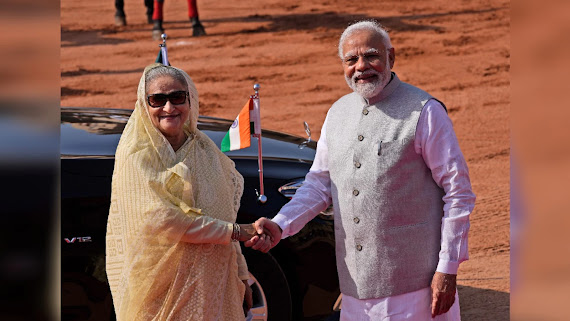Sheikh Hasina Resigns Amidst Turmoil: What Challenges it Poses for India? What is the future of India-Bangladesh relations?
Sheikh Hasina, has resigned from her position as Prime Minister of Bangladesh and reportedly left the country with her sister following violent nationwide demonstrations. Protesters have taken control of the Prime Minister's residence, and images of their celebrations are circulating widely on social media.
Interim Government and Military Involvement
Following Sheikh Hasina's departure, Army Chief General Waker-uz-Zaman addressed the nation, announcing that an interim government will be established soon. He has been in discussions with various political parties regarding this transition.
The protests, which began last month against reservations in high government positions, escalated significantly, raising concerns about the country's future stability and governance.
Bangladesh was given prominence at the G-20
This situation raises questions about who will assume power in Bangladesh after Sheikh Hasina and what implications this may have for India's relationship with Bangladesh.
India and Bangladesh have maintained bilateral relations for 53 years, and last year, India extended a invitation to Bangladesh to attend as special guest the G-20 summit held in New Delhi. Bangladesh was the only neighboring country given such prominence at the G-20, but with Sheikh Hasina no longer in the role of Prime Minister, this could pose challenges for India.
Zia's BNP has been inclined towards Islamic fundamentalists
Two significant figures in Bangladeshi politics are Sheikh Hasina of the Bangladesh Awami League and Khaleda Zia of the Bangladesh Nationalist Party (BNP). For the past 15 years, Sheikh Hasina's Awami League has been in power, with her serving as Prime Minister.
Experts say India prefers to see Sheikh Hasina's government in Bangladesh. From the very beginning, the Bangladesh Nationalist Party has been inclined towards Islamic fundamentalists. They have always been advocating for Pakistan, which benefits China, as China and Pakistan are allies. The BNP is supported not only by Pakistan but also by China. In the absence of Sheikh Hasina, it is likely that the BNP will move closer to Pakistan and China rather than India.
Sheikh Hasina maintained a balance
Sheikh Hasina maintained a balance between China and India, but now questions have arisen about this balance. The Awami League believes in a liberal, secular, democratic fabric, which is why India gives it preference. India desires stability and democracy in its neighboring countries, including Bangladesh.
How economic ties and trade will be affected?
Bangladesh is India's largest trading partner in South Asia. Despite COVID-19, the trade between the two countries was US$ 10.78 billion in 2020-21, and this trade increased by 44 percent to US$ 18.14 billion in 2021-22. The total India-Bangladesh trade between 2022-23 was US$ 15.93 billion.
Both countries are collaborating on significant projects in the field of electricity and energy. Bangladesh is currently importing 1160 MW of electricity from India, and the India-Bangladesh Friendship Pipeline is crucial for transporting high-speed diesel. Over the past decade, India has invested thousands of crores of rupees in Bangladesh for the construction of roads, railways, and ports.
Strategic Importance
The current situation in Bangladesh will also affect trade with India, and China may push forward its demand to use the Chittagong port. India considers Bangladesh very important for its 'Act East' policy, as the eastern states of India and Bangladesh are geographically interconnected. Bangladesh's support is necessary for development and connectivity in this region.
Security Concerns
India shares a border of about four thousand kilometers with Bangladesh. Therefore, in view of challenges from countries like China and Pakistan, India needs a friendly government in this region. The government prior to Sheikh Hasina played an important role in providing shelter to separatists in Northeast India. Sheikh Hasina's government has significantly curtailed the support for the separatist movement in Northeast India, handing over key leaders of the separatist movement to India.
The resignation of Sheikh Hasina and the ensuing instability in Bangladesh pose significant challenges for India. The future leadership of Bangladesh and its political alignments will play a crucial role in determining the stability of the region and the future of India-Bangladesh relations.

